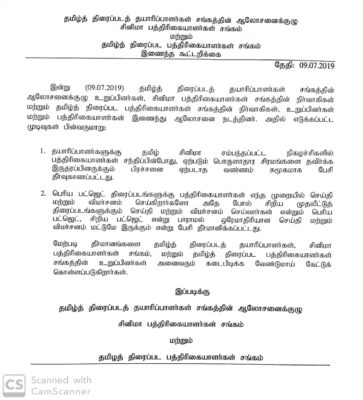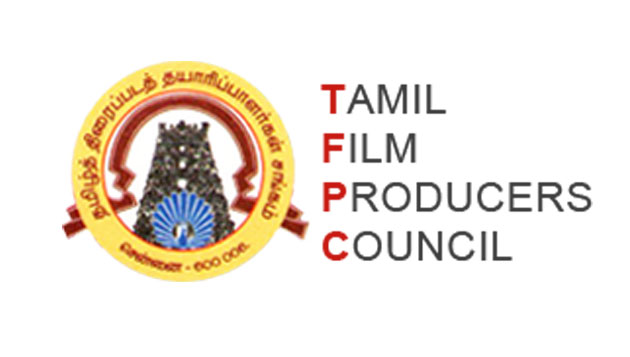Members from the Tamil Film Journalists Association met Tamil Film Producers Council (TFPC) and South Indian PRO-Union members after the opposition to their statement yesterday, and largely agreed to the decisions taken by them. These mainly relate to reducing expenditure on food and monetary gifts to journalists who attend film-related events. Ironically, this was a culture they started, and nourished, before it turned into a Frankenstein.
The journalists’ association urged producers to not give money to presspersons during press shows, success meets, audio launches, trailer launches and any Tamil film-related event. Mediapersons will only be served tea and snacks at these events.
The original statement said legal action would be taken against those who criticised a film “in the name of a review to degrade the movie, its actors, and directors”, and that such critics would not be allowed entry to events hereafter.
There was huge opposition to this from producers and journalists on July 8. They met TFPC’s ad-hoc committee members yesterday afternoon reached a compromise. According to their statement, presspersons have also agreed that small budget films should also be given equal importance in their reports.

WhatsApp Image 2019-07-09 at 2.29.52 PM
Journalist Kodangi, Secretary of Film Journalists’ Association, said, “We hugely condemned their earlier statement as it was an insult to the press, but the TFPC apologised for it and called us to speak about it. Their main concern was reducing costs at film events. About 250 presspersons attend an event today, and they said they needed to identify “real” journalists, and regulate the number.”
The association members also agreed for action to be taken against reviewers in case they stoop down to personal attacks against filmmakers. However, like many critics pointed out on social media yesterday, the terms of what constituted offensive and derogatory content was not explained.
Kodangi said, “They have promised that they will approach the matter legally and the idea is not to hamper anyone’s work. So, we decided to agreed to it.”
The journalists’ association has signed an agreement agreeing to these decisions and the recommendation has been sent to Tamil Film Producers’ Council (TFPC) special officer N Sekar.
Many PROs Silverscreen spoke to say there is a dire need to regulate the number of journalists attending an event. “For a movie preview, more than 200 people turn up. A certain number is genuine, the rest claim to represent a website or channel. How do we go and verify credentials? We are the bridge between the producer and journalists, and when he asks us for the reviews published or broadcast after the preview show, we are lost, because so many come in to enjoy a free show. We need help from the industry to weed out those who claim to be part of the profession strictly for benefit,” says a veteran in the trade.
Producer T Siva, who is part of the ad-hoc committee or advisory body, said the problem was mainly with Youtube reviewers and not those in print media. “Many YouTube channel hosts have made reviewing a business. It’s okay to criticise a film, but a lot of them speak offensively and also ask the audience to not got to theatres to watch a film. We don’t think they have the right to say this. Such reviewers will not be allowed to our events hereafter, and legal action will be taken.”
Producer JSK Satish, also a member of the ad-hoc committee said the new rules will be adopted for films from now on. He said, “We spend a minimum of Rs 1.5 lakh per event on gifts to presspersons. It initially used to be only conveyance fare, but has now turned into what we call ‘anbalippu’ (gift). This has become a culture and we wanted to stop it for the benefit of producers and genuine reviewers.”
He insisted that all reviewers will not be opposed. “There are many like ‘Blue-Shirt’ Maaran on Youtube who criticise directors, producers and actors using swear words and gain popularity. We will file defamation suits against them. We can also charge them under the Copyright Act if they use stills from our movies.”
‘Blue-shirt’ Maaran, the host of Tamil Talkies, the Youtube channel with close to one million subscribers, responded to the statement saying, “If producers find any review offensive, they can approach the matter legally. This decision will also be applicable to all reviewers and not just those on Youtube or my channel specifically.”
He added that he does not take money for his reviews. “I have been approached by producers to give good reviews, but I have not taken money from anyone.”
Recommended
Other producers have largely welcomed these rules. M Kumaran (Kumar) of Vijaya Productions, one of the oldest production houses in Tamil cinema, said that reviews never used to be derogatory but have become so in the last decade. “It’s also now that we have started this concept of giving gifts to journalists. The decision taken at the press meet is right,” he said.
Some producers say they spend about Rs 2.5 lakh on gifts for journalists at every press meet and the amount paid varies from Rs 500 to Rs 6,000 per person depending on the popularity of the media organisation. In addition to this, about Rs 3 lakh is spent on food.
Director Seenu Ramasamy was among those who spoke about the new rules. He said, “Legal action should be taken against who get the money and also fame, and speak ill of a film. But genuine reporters must be paid a conveyance fee, please consider this Tamil Film Producers’ Council.”
He also told Silverscreen, “This decision had to be taken by the TFPC and presspersons. They have had talks and reached a compromise to settle the issue.”
படம் வெளியான நாளே பணம் விளம்ரமும் பெற்று
தரக்குறையாக ஒருமையில் விமர்சனம் செய்வோர் மீது
சட்டநடவடிக்கை நியாயமானது ஆனால் நேர்மையான பத்திரிகையாளர்களுக்கு போக்குவரத்துத்செலவு (convenience) தருவது நியாயமானது,
தயவு செய்து மறுபரிசீலனை செய்யவும்,
நன்றி.#தமிழ்திரைப்படதயாரிப்பாளர்சங்கம்— Seenu Ramasamy (@seenuramasamy) July 9, 2019
C Ravinder of Libra Productions said, “The so-called gifts are a marketing tool. Why are we giving money to journalists in exchange for good reviews? It’s like bribing, and is also an additional expenditure, especially for small film producers who are usually in debt before a film’s release. Moreover, some reviewers use offensive words to criticise filmmakers and actors. We welcome criticism to improve our work and encourage us to make better movies, but personal attacks are not acceptable.”
He added that the talk in film circles, however, is that the new rules are not going to affect the business of films in any significant way. “There were differences between producers and presspersons that needed to be settled.” But, there are more pressing issues to be addressed by the TFPC, he said. “For instance, we need regulations on film releases. So many movies are not releasing at the last minute due to many issues. There needs to be a way to ensure films release as scheduled, or at least compensate small producers for undue release delays.”
Image Courtesy: iflicks



